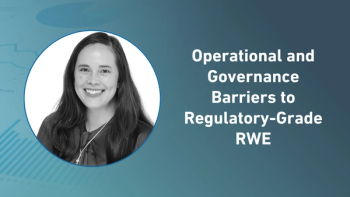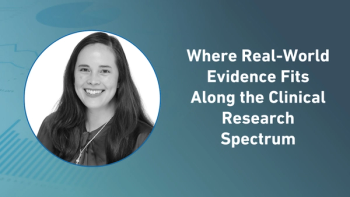
- Applied Clinical Trials-05-01-2023
- Volume 32
- Issue 5
A Life Less Ordinary: Remembering The Godfather of ePRO
Remembering Steve Raymond, PhD, "the Godfather of ePRO."
I often referred to Steve Raymond, PhD, only partly in jest, as “The Godfather of ePRO.” I had good cause to use that endearing term, though it fails to do any real service to his achievements and abilities. Though I have been and continue to be fortunate to have interacted with true thought leaders and innovators in the field of electronic patient-reported outcomes (ePROs) and electronic clinical outcome assessments (eCOAs) more broadly, I believe Steve was the original and enduring master of this craft and that is something that will never change. I learned from him, argued with him, laughed with him and at times maybe under-appreciated him, but every interaction we had around getting "first-hand knowledge" from patients (to steal the legacy tag line of PHT Corporation, which Steve founded in 1994), I always felt like I was going to the very top of the tree.
When I learned that Steve had passed quite suddenly back in March, it hit me harder than I’d expected. I think that was because of the scale of his unacknowledged presence in the world of eCOA, which has been my career for 20 years, and an acknowledgement of how Steve helped shape my thinking.
My first meeting with Steve was an education itself. In retrospect, the self-assurance I’d developed from early successes in ePRO had given me a sense of authority I hadn’t really earned. Steve had earned that status, and it struck me as I drove away from that meeting that he had skillfully finessed my thinking toward his position while allowing me to think I was almost right, and, hence, unoffended. And he did that more than once, always taking the dissenting voice on a journey where we’d arrive at harmony and understanding, and ultimately him being right. That required a great deal of grace, and that is a quality I think carried much of what Steve said and did.
When I first had a chance to talk informally with Steve with no “sponsor vs. vendor” dynamics at play, I gained a deeper understanding of what he was really trying to achieve—healthcare through data-driven insights. He described concepts far beyond presenting a PRO electronically to a patient, and I recall vividly the passion unfold as he spoke, his whole body energized, almost bouncing in his chair and drawing me in to his vision. It never really felt like business—it was about progress. I think Steve inadvertently taught me that it’s OK for a provider to be a true partner. I marveled at his thirst for challenging erroneous assumptions and concepts, and his limitless intellectual curiosity. So much of what we encounter as inefficiency and procedural complexity is based in legacy and indefensible thinking, and Steve never backed down from that fight.
It’s telling that as Steve moved into something approximating retirement, he created another company with a mission to deliver exactly what he detailed to me personally 20 years ago—first-hand health insights. For me, the whole notion of placing the patient’s voice at the very heart of drug development was pioneered by Steve, and yet it remains a concept we still have yet to embed as required over being preferable.
I began to wonder how many colleagues that work in eCOA realize and appreciate Steve’s impact on them and what they do. When I shared an email among the eCOA Consortium members about his passing, many colleagues shared an acknowledgement of that impact, and yet it was evident that this appreciation was not universal. And that’s why I write this—it isn’t just a case of him being there at the start, it’s about how he drove us toward achieving the potential. A truly great man with a legacy to match.
Rest well, Steve, and thank you—for everything.
Authored by Scottie Kern, executive director, eCOA Consortium.
Articles in this issue
over 2 years ago
Modern Technology is Shaping the Face of COAover 2 years ago
Implementing ePROs in Arthritis Clinical Researchover 2 years ago
Executive Roundtable: The Rise of RWD in Clinical Researchover 2 years ago
Optimal COA Measurement Strategy in Modern Oncology Trialsover 2 years ago
Measured Momentum: Digital Biomarkers and Clinical Trialsover 2 years ago
A Complex Picture: What to Know About Clinical Trials Insuranceover 2 years ago
Striving for Carbon Footprint Benchmarksalmost 3 years ago
Agenda Aims to Recharge UK-Based Clinical Trial Innovationalmost 3 years ago
FDA, Industry Prepare for End to COVID Health EmergencyNewsletter
Stay current in clinical research with Applied Clinical Trials, providing expert insights, regulatory updates, and practical strategies for successful clinical trial design and execution.




